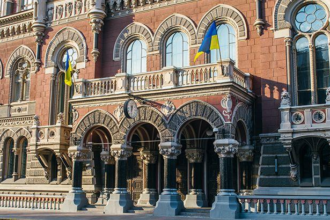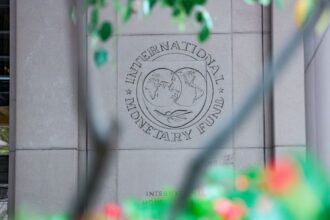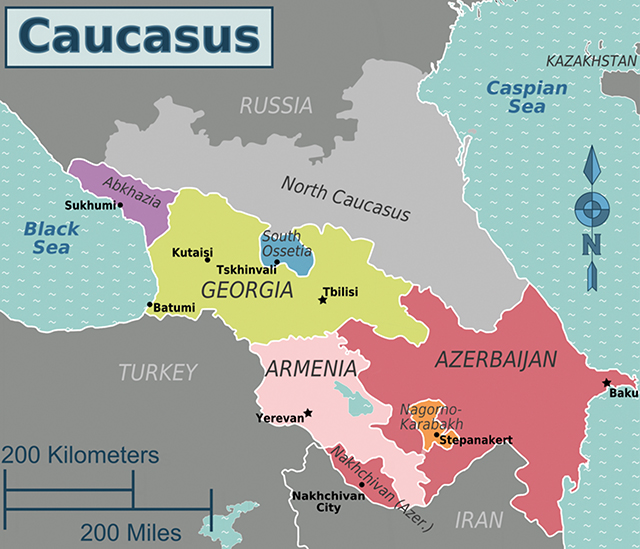The new order will be dominated by Georgia, located in the Caucasus. Russia, Turkey, and Iran will attempt to involve Georgia in their peace and security initiatives
Recently, it has been asked frequently in Georgia if the country’s policy on foreign affairs is changing. Georgia is again being portrayed as “either with Russia or the West”. The reality, however, may be more nuanced. We could be witnessing an attempt to establish a multifaceted foreign policy. This is due to a variety of reasons, including problems in the EU as well as the liberal world order. Parallel to these changes, there is a new order emerging in the South Caucasus where Georgia’s importance will be critical for the large neighbors.
In the years to come, Georgia could face qualitatively more difficult challenges than it has faced so far. The country’s fixation with the West in its foreign policy has brought many benefits. However, compared to other delays, the issue of Georgia joining NATO and EU has been delayed for a longer period. This, of course pushes Georgia towards finding a solution.
In an earlier article, I suggested a possible solution: a multi-vectored foreign policy. In order to achieve a more balanced policy, Georgia will need to strengthen its relations with major players in Eurasia. Tbilisi will continue to pursue its official foreign policy goal of deepening relations with the West, but it will no longer be inflated by unrealistic expectations. A realistic approach creates more room for foreign policy maneuvering. Georgia’s location in the Middle East and Eurasia offers an opportunity to be more active in diplomacy as the world moves rapidly towards a multipolar order.
In the 1990s, Georgia experienced a period of internal turmoil. However, the foreign policy and world events were generally positive for the country. The West was ascendant, and Russia’s influence was decreasing. The world was transitioning from a bipolar world to one of American hegemony. These global shifts created an advantageous geopolitical climate for a small, poor country that wished to escape Russian influence. Georgia had a long window of opportunity to join NATO or the European Union. However, both Georgia and its Western allies squandered it before 2020.
Today, things are different. The liberal world order faces a serious crisis. The rise of China, and the anti-Western policies of other Eurasian nations are causing problems both within and outside the system. In the new situation where Georgia is unable to join the European Union or NATO in the near term, the country must look for a multi-faceted approach.
As we have discussed, the geopolitical environment around Georgia is becoming increasingly difficult. First, the concept spheres-of-influence has resurfaced in the region. Second, the balance-of-power idea is increasingly being used as a foreign policy tool by Eurasian great and middle powers.
What will be the new world order and what role will the South Caucasus play in it? The world will be divided into two large and multiple small centers. The US and China are two of the world’s leading players. Both will be surrounded with a number closely aligned nations. Washington has taken steps in this direction, including the recent Australia-UK and US tripartite agreement (AUKUS). Beijing’s vision of a formal union may be different from China’s, but it will still try to bring together illiberal nations who support Westphalian principles such as territorial integrity, sovereignty, and non-interference with the internal affairs other countries.
Georgia will be able to develop a more balanced policy by strengthening relations with major players in Eurasia
Along with China and the US Russia, India and Turkey will also try to create small exclusive geopolitical areas along their borders. Their efforts will be closely tied to Washington or Beijing’s interests.
The future world order is chaotic. It will also be a hierarchical order, with China and America taking the lead and others having less influence. This will still form the Eurasian Order.
South Caucasus is at the heart of these global changes as it borders three major players on the Eurasian continent: Russia, Iran, and Turkey. All three are motivated by similar foreign policy goals. Among them is the withdrawal of nonregional forces from South Caucasus. The West as a collective should be present in the region, but not dominate it.
In this way, the emergence in the world of a brand new order will lead to a similar order in South Caucasus. In the South Caucasus, a hierarchical system will be established similar to the world’s. Russia will be the main power. Moscow knows that it’s impossible to create a monopoly. The Russian Federation of today cannot establish complete control over the South Caucasus as it did during the Russian Empire or the Soviet Union. The economically weak Russia currently lacks the resources to achieve this. At the same, Russia is losing its geopolitical reputation, as shown by the excessive military element in its policy in South Caucasus. The creation of more military bases is a way to maintain influence in the South Caucasus. A clear example is the deployment of Russian Peacekeepers in Nagorno Karabakh.
In order to achieve this, Russia will attempt to establish a hierarchical system in the South Caucasus. This order will be built on a close partnership with Turkey and Iran. Ankara will recognize Moscow’s hegemony. This does not exclude disagreements or a fierce diplomatic and economic rivalry between these three powers. In the new hierarchy, there will be attempts to replace the hegemon. In this regard, Turkey’s efforts to contain/reduce Russia’s influence will be expanded. Ankara will try to normalize relations between Yerevan and Ankara, which will chip away at Russia’s power. Improved Armenia-Turkey relations mean a decrease in Yerevan’s dependence on Moscow for its economic and infrastructure needs.
Georgia, located in the middle of the Caucasus region, will play a key role in the new South Caucasus Order. Russia, Turkey, and Iran will attempt to include Georgia in their peace and security initiatives. It will be hard to build a long-term new order in the South Caucasus if Georgia is not involved. This gives Tbilisi a few advantages. Tbilisi could hope to gain concessions by agreeing to take part in the new order. These concessions might include security in the Black Sea region, Tskhinvali and Abkhazia. Georgia can achieve greater results with the correct and consistent application and constant maneuvering of the idea of power balance.
Along with opportunities, there are also many geopolitical challenges. The main problem is the fact that the establishment a new order in South Caucasus would significantly reduce the collective influence of the West in the region. This could cause a rift between Georgia and Western countries, which can be both economically and political painful. It may also affect Georgia’s democratic process, as anti-liberal attitudes become stronger.
Georgia’s success depends on its ability to take advantage of these opportunities, and avoid threats. This will be hard to implement, because it requires a cohesive class of politicians who are less radical and more focused to channel national energy towards achieving specific foreign policy objectives. Georgia is the only country in the region with a political class that is so fragmented. The exception to this is Armenia. This confirms that the success of Georgia’s foreign policy is heavily dependent on the resolution of internal problems.
Emil Avdaliani, a professor of European University, is also the Director of Middle East Studies for Geocase.
Emil Avdaliani: Analysis
Read More @ georgiatoday.ge




